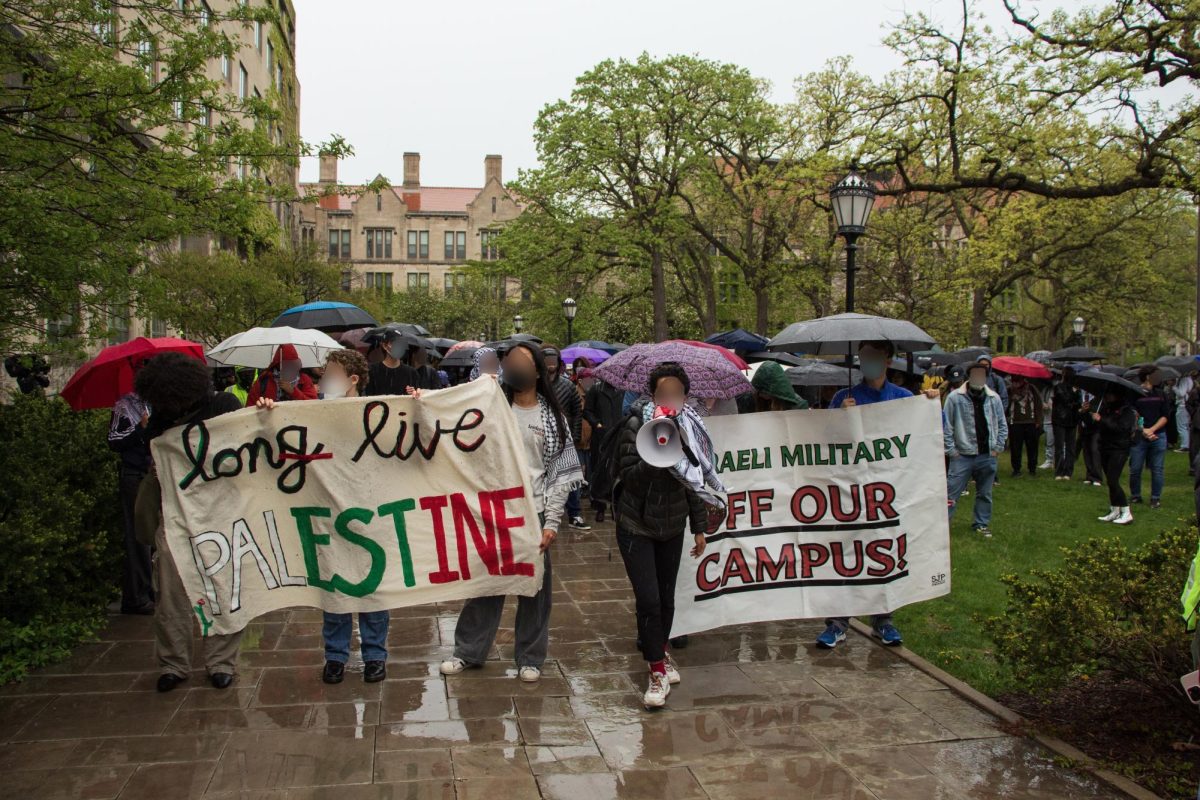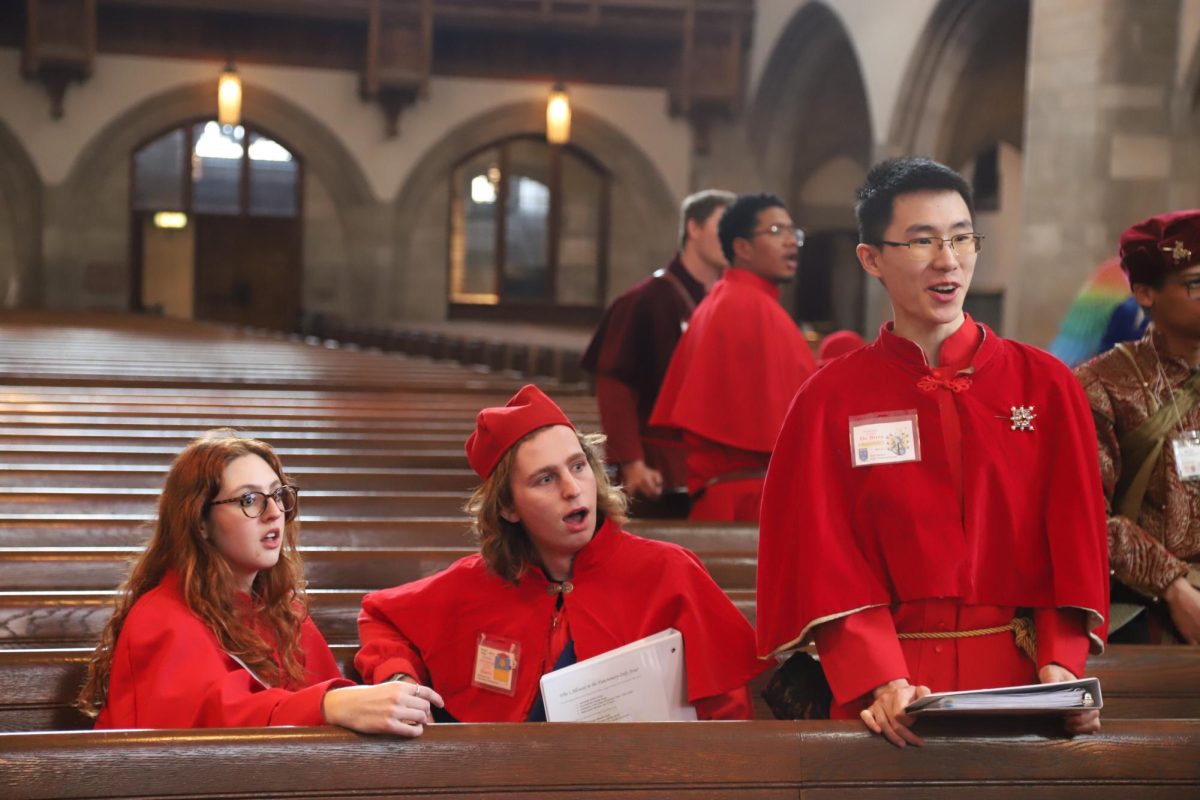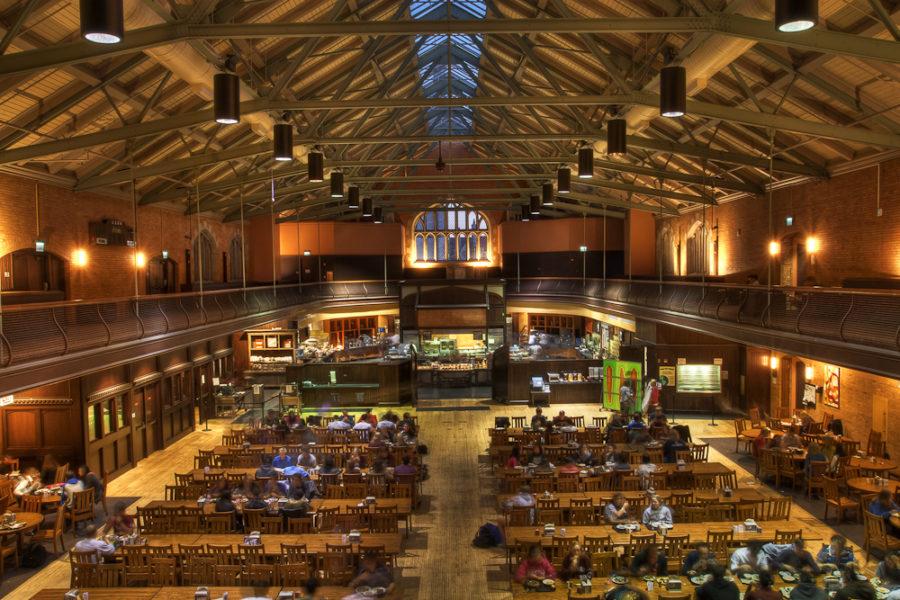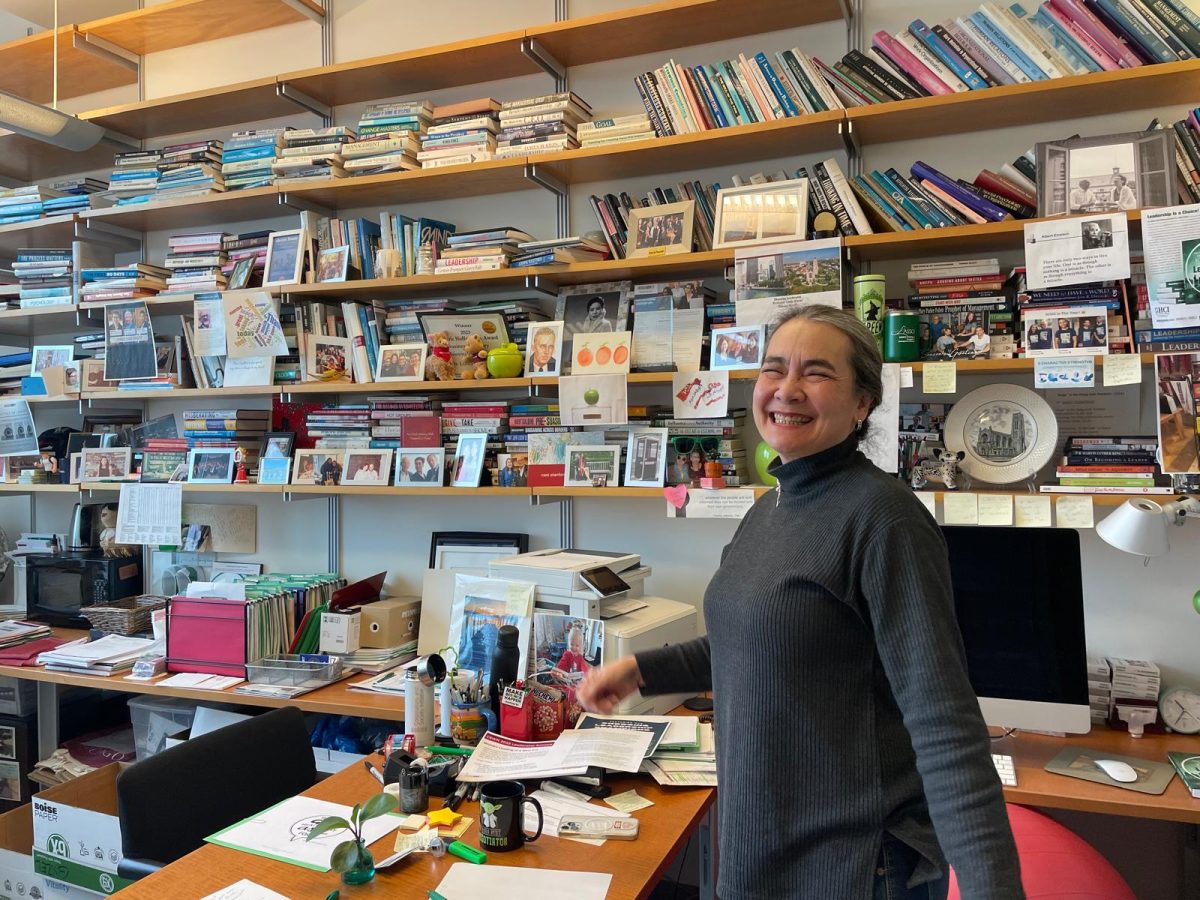This piece is an excerpt from the third of a three-part series on the history of protest and the disciplinary system at UChicago. It covers the 2024 pro-Palestine encampment and Institute of Politics occupation. Other articles have covered 1967–1974 and 2010–2020.
One year ago this week, UChicago United for Palestine (UCUP) launched its “Popular University for Gaza” protest encampment on the main quad, erecting tents and artwork across a gradually expanding footprint. After nine days on the ground, the encampment was dismantled by the University of Chicago Police Department (UCPD) on May 7, 2024.
The Encampment’s First Four Days
Throughout the 2023–24 school year, pro-Palestine student groups responded to the October 7 attacks and the escalating Israel–Hamas war with protests, rallies, and sit-ins at colleges and universities across the country. At UChicago, UCUP called on the University to divest from Israel-aligned businesses and enact a program of reparations for Palestine and the South Side.

Throughout the academic year, many university presidents were brought in front of Congressional committees to justify their handling of the protests, and multiple university leaders, including Harvard University President Claudine Gay and University of Pennsylvania President Elizabeth Magill, were forced to resign.
Tensions simmered as the spring wore on, with demonstrations continuing intermittently until early April, when students at Columbia University established the first “Gaza Solidarity Encampment” and sparked a new wave of demonstrations following in their example.
The wave of protest encampments reached UChicago on April 29, when protesters gathered on the western end of the main quad near Swift Hall and established an encampment of their own. While UCUP’s plans had been leaked the previous week, the University community was not entirely prepared for its launch that day. As the Hyde Park Herald reported, one UCPD officer said that they “weren’t expecting this until Wednesday.”
Within hours, University President Paul Alivisatos released the first of several messages to the University community “concerning the encampment.”
In the message, Alivisatos indicated his willingness to allow the encampment to remain as a testament to UChicago’s commitment to free expression but warned that “if necessary, we will act to preserve the essential functioning of the campus against the accumulated effects of these disruptions.”
In his statement, Alivisatos also included an extended digression concerning the military roots of the word “encampment,” earning him the brief addition of “etymologist” to his Wikipedia profile.
Notable local leaders, including Reverend Jesse Jackson Sr., Weather Underground co-founder Bill Ayers, and 25th Ward alderman Byron Sigcho-Lopez visited the encampment to express their support, participating in rallies and hosting teach-ins on topics related to protest history and Palestine.

After three days of the encampment, the University offered the encampment’s organizers a one-hour meeting with Alivisatos and Provost Katherine Baicker in exchange for the removal of the encampment and cessation of further violations of University policy. In addition to a private meeting, the University offered an open forum with the president and provost to discuss “the many viewpoints related to the Israel–Hamas War and divestment.”
UCUP declined the proposal on the fourth day, refusing to dismantle the encampment unless the University committed to their demands.
A thunderstorm later in the day prompted University Facilities Services to take down the American flag from the main quad, in keeping with protocol, which protesters quickly replaced with a Palestinian flag. The day ended in a brief rally around the flagpole and a confrontation with UCPD officers trying to take the Palestinian flag back down. Security officers removed the Palestinian flag the next morning and cut the halyard, preventing any flags from being raised.

Frat Brothers March on the Encampment
On the morning of May 3, the encampment’s fifth day, University community members received a second email from Alivisatos about the encampment.
“On Monday, I stated that we would only intervene if what might have been an exercise of free expression blocks the learning or expression of others or substantially disrupts the functioning or safety of the University,” Alivisatos wrote. “Without an agreement to end the encampment, we have reached that point.”
Faculty and Staff for Justice in Palestine, an organization composed of pro-Palestine faculty and staff members, decried the email in a statement to the Maroon. “The administration has not negotiated in good faith with our students, offering them absolutely nothing in hastily arranged meetings. In light of the brutal police repression of students, faculty and staff across the country, threatening to forcefully dismantle the encampment is a serious escalation.”
Around noon that day, the encampment hosted a rally with more than 200 participants; at the same time, opposing student group Maroons for Israel hosted a picnic on the other side of the quad. Shortly afterward, a group largely made up of fraternity members marched toward the encampment waving American flags.
Protesters and counterprotesters faced off across the center of the quad, with pro-Palestine protesters chanting, “UChicago you can’t hide, you invest in genocide,” and counterprotesters chanting, “U.S.A., U.S.A.” and playing patriotic songs.
At 1:06 p.m., the University sent out a cAlert asking community members to avoid the quad as the crowd grew to roughly 1,000 people. Twenty-five UCPD officers, some in riot gear, lined up between the two groups and prevented people from crossing to either side. Chicago Police Department (CPD) and Allied Security officers were also present on the scene.
As the demonstration died down, Arthur Long, a fourth-year in the College who led the counterprotest, told the Maroon, “I’m all for freedom of speech. And I love that UChicago protects that… But you don’t have the freedom to vandalize, you don’t have the freedom to obstruct University walkways, and you don’t have the freedom to disrupt learning, spraying ‘Death to America’ on buildings, chanting ‘Death to America.’”
The previous day, Long had posted on Sidechat calling on members of the University community to join him in putting the American flag back on the flagpole.
In a statement to the Maroon that afternoon, UCUP said they would “[remain] steadfast in holding the encampment but will not engage in escalation with police or Zionists.”
Ultimately, the encampment was forcibly disbanded by UCPD in a police raid beginning shortly after 4 a.m. on May 7.
Alumni Weekend Protesters Occupy IOP
Following a rally around the alumni beer garden on May 17, a group of “autonomous” pro-Palestine protesters, many of whom were alums, marched from a second rally on the Midway Plaisance to the Institute of Politics (IOP) building near 57th Street and South Woodlawn Avenue.
Protesters entered the building, barricading doors and spray-painting security cameras. Others gathered on the lawn outside, hanging banners and erecting tents. One demonstrator hoisted an effigy of Alivisatos onto a tree in front of the building, where it remained for several hours.
A person with knowledge of the situation told the Maroon in an interview in 2025 that protesters brought barricading tools, medical equipment, locks, smoke bombs, tactical equipment, and food into the building.
Heidi Heitkamp, director of the IOP, was inside the building during the occupation and exchanged words with the protesters before UCPD escorted her out. In an April 2025 interview, Heitkamp told the Maroon, “It was not well thought out on their part in terms of how they were going to occupy this building.”
“Eventually I just said, ‘I’m not leaving.’ And they said, ‘Well, you know, you’re going to get hurt.’ And I said, ‘Who’s going to hurt me?’”
UCPD removed protesters from the building after less than half an hour while CPD officers observed from the street. No arrests were made, and protesters remained on the property until around 9 p.m. when UCPD officers forced them out of the IOP’s backyard.
The group reconvened outside of Alivisatos’s house, where they rallied again, rehanging and beating the piñata-style effigy of Alivisatos on the front lawn.
Before the group split up, one organizer said, “We know that this is not about us; this is about Palestine.”
This piece was produced by the Maroon’s Investigations team, whose members are Celeste Alcalay, Evgenia Anastasakos, Elena Eisenstadt, Gabriel Kraemer, Zachary Leiter, Tiffany Li, and Nathaniel Rodwell-Simon.













MA grad of ‘24 / Apr 29, 2025 at 1:42 am
I hope there is — eventually — an investigation into who was involved into the protest organization. UCUP refer now and then to allies; one of the earlier rallies in the quad featured people willing to distribute ideological literature; and this very article mentions that only “most” of who occupied the IOP were alumni.
For what a personal perspective is worth, the encampment seemed to be the lesser disruption than the protest marches. The encampment felt coordinated but not controlled: people displayed various affiliations and flags (I specifically appreciated the small memorial to the ethnic cleanse in Nagorny Karabakh), were willing to engage in conversation, and did not display any hostility even when seeing skepticism or opposition. Again, though: these were my interactions.
The marches, the rallies, and the day of IOP occupation felt, by contrast, deliberately riled up and hostile. This is a personal perspective: I am an Eastern European Jew, my family and broader community has a history of both state and interpersonal violence against us based on our ethnic group.
October 7th was a cause of great distress. The conversations that followed (including the debate on whether them the jews are an ethnic group) were a cause of distress. The chants “you can’t hide”, right after the videos and photos of Israeli who did fail to hide and were slaughtered, were and still are distressing.
My point is not to say that the protest should be cancelled because of my thin skin — I am saying that there was nothing done to regulate the protest response to and deployment of violent rhetoric. Individuals in conversation yielded that their protest called for a destruction of the state of Israel. When asked about the practical consequences of that for the Israeli citizens, they stopped engaging (or said things I won’t cite for the lack of recorded proof).
And in this strand of developing protest, the occupation of the IOP is a very damaging case. The public-facing side included a vandalized facade — if memory serves, calling for the dissolution of the university — and a direct invitation of violence in the form of hanging an effigy of Alivisatos and then smashing him. How do they expect anyone to read this other than “we want to advance our political goals with violence”?
The exchange with Heitkamp adds more to that: “Eventually I just said, ‘I’m not leaving.’ And they said, ‘Well, you know, you’re going to get hurt.’ And I said, ‘Who’s going to hurt me?’” It does not matter that they failed to find anyone willing to do violence just yet; they were ready to threaten it.
And yet when a handful (and only a handful) of protesters got in trouble and were barred from graduation, there was widespread support for them. Signatures included dozens of staff members, many of them professors. Inside the chapel, at the pews and by the altar, signs of protest against the university actions. I was one of the first people in my cohort to participate in it, motivated by how non-transparent the university actions were. Why only six people? Why them specifically and why suspend their graduation on a short notice, then refuse all communication? This felt bitter and ineffective.
But “bitter and ineffective” is a good summary for how the entire cycle of protests went that year. The protest’s immediate goals — installing genuinely powerful pieces of (ideologically useful) art, rallies, and the prolonged survival of the encampment — were all met with little opposition from the university. There even were words about agreeing to support academics from Palestine, although no transparency about the negotiation process, the specific demands, or commitments made.
The same lack of transparency extends to all of the UCUP actions. Who organizes them? Who assist them, what are their networks? Is it as grassroots as it appears, or is it a coordinated effort? I am not asking this to cry conspiracy, and I trust it did originate from a handful of students. But this obscurity of the figureheads, claims of horizontal structure to the movement, and the presence of unidentified and unidentifiable alumni with megaphones makes it very hard to support UCUP without being a permanent part of the university life (as an MA student, I wasn’t).
UChicago Jewish activists I spoke to shared this confusion: they were interested in organizing for peace, but the encampment leadership was impossible to get to, and the general rhetoric made any advocacy for “peaceful coexistence” feel unwelcome.
The same sentiment and confusion were echoed by the prominent Israeli protest group, Standing Together. At home they achieve tangible results in opposing settlers, winning access to housing and legal protection for the Arab and Palestinian communities in Israel (irrelevant of citizenship status), and now organizing the biggest anti-war protests yet.
Coming to the US, and coming to Chicago specifically, the leaders of Standing Together expressed deep puzzlement over the slogans and actions of the protesters: they were profoundly unproductive. The observable result of the protest and the encampment was disruption, harsh retaliatory measures in autumn, and making any future protest action harder. A just war lost, it seems, mattered more than any small victories for their cause.
ugh / Apr 29, 2025 at 4:26 pm
oh my god. be quiet.
Rawhi Fattouh / Apr 29, 2025 at 7:27 pm
You should be respectful of the opinions of others.
I second "be quiet" / May 1, 2025 at 5:48 pm
It’s one of thousands of tiresome case studies on how to feel superior while siding against a colonized people subject subject to decades-long ethnic cleansing and a year and a half of outright genocide. You would have Palestinians tap-dance to prove that they’re civilized and human, in between fleeing for shelter from US-made bombs and looking for anything to fill their bellies — then you’d side against them anyway. Thank you, thank Alivisatos and the trustees, thank Bret Stephens and his liberal counterparts, thank Harris and Trump and Sanders and Stefanik — for helping me understand why colonized peoples need armed resistance. You’re so lucky you weren’t born in Gaza and being expected to tap dance by someone like you. Embarrassment to UChicago
Same MA grad / May 1, 2025 at 9:06 pm
I have not said a word about the victims of the war, whose deaths, entirely avoidable, are fetishized by the American protest. Including, by the way, the one in Chicago.
The protest objectively failed to change the university policy to do an ounce of benefit to Palestinian scholars or people. The calls to “destroy America”, “globalize Intifada”, or otherwise *continue* the war — do nothing to stop the suffering of the people on the ground.
You are suggesting that I demand proof from Palestinians that they are human — no, I want the bloody idiots with Hezbollah flags on the university lawn to think two steps ahead. You want to call for violence, fine, but do that after you’ve used your political leverage to protect the people you claim to support. Otherwise the only results from the protest are the stricter regulations and the chance to say “if only all our demands were met” when it is already too late.
Student / May 2, 2025 at 2:03 pm
Last week attendees of the Quantum Exchange left and told protestors on the way out that they had been swayed to not put their labor towards genocide. Ah, what a pointless, performative protest. As long as UChicago admins (in contrast to those at many other unis) refuse to disclose and divest from war crimes and insist on welcoming war criminals and fascists to campus while responding with force to pro-Palestine dissent, for you that will always reflect a failure on the part of protestors. Not the admins and trustees. This is why, I repeat, your take is an utter embarrassment to the concept of higher education.
Same MA grad / May 3, 2025 at 2:44 am
You fail to engage with my point. Quantum research does not contribute to that war. These attendees’ verbal commitment to not “labor towards genocide”, even assuming they would be asked to do so, will only bear consequence five, ten years down the line. At that point, it would be a humanitarian miracle if there is still a Palestinian state to thank them for that.
Again, if the protest is against Israel, or against USA collaboration with Israel, sure. If the protest is against the ethnic cleansing and for the survival of the Palestinian state and national identity, this is pointless. Netanyahu does not care that his own war cabinet is fed up, he will care even less that his country might lose some research opportunities in a few years’ time.
UChicago admin did refuse to yield to the protest demands, yes. What would compel them? But there was a point when they were willing to negotiate, and at that exact point the protest could have achieved something tangible — funds to support Palestinians, maybe scholarships to evacuate Palestinian scholars, any other minor concessions. And *even if* the demand of boycott and divestment had been met (again, under which pressure?), that lets the dutiful protesters say that their hands are clean of any blood without doing anything to stop the bloodshed.
Boycott and divestment do not save victim lives right now, supplies and advocacy on the ground do. The protest at UChicago failed to deliver those, it failed to engage with the anti-war protest in Israel, and it failed to achieve anything to leverage UChicago’s power as an institution, either to support Palestinian lives or to contribute to the anti-war effort on the ground.
Re: recent MA grad / May 6, 2025 at 1:52 am
Why is MA grad inventing aims that are inconsistent with the aims and demands that have been made clear in every protest at UChicago? Yet MA grad becomes quite detail-oriented when it comes to any morsels that advance the false narrative that student protests at UChicago have been mindless, self-absorbed, hateful, bloodthirsty. Odd to just put such lies in the comments section — just tweet them to Rubio and he’ll start the desired investigation and maybe abduct an undergrad or two. Problem solved.
There are basic facts re: the encampment negotiations that MA grad has misrepresented. Is it right to allow oneself to be baited into a back-and-forth to correct the record on details from the negotiations that have been laid out elsewhere? This has proved an effective way for disingenuous people on campus to shift the focus away from UChicago’s complicity in genocide and apartheid; the complicity of companies like Boeing and Microsoft; the voices of activists *in occupied Palestine* (including in conversation with student activists here), altogether overlooked by MA grad’s insistence that UChicago students have failed to coordinate with Israeli “anti-war” activists; and the insistence by genocidal Israeli officials that campus protests and BDS *are* getting in their way.
For those who are reading this exchange in good faith, all one has to do is go look at the demands on UCUP and SJP UChicago’s Insta pages, or go to one of their events and just have conversations. Having done so, the picture painted by MA grad is unrecognizable and highly suspect. If only they were as interested as they claim in pursuing the best possible approach to disrupt genocide right now. A word to the wise, don’t allow yourself to be distracted by those acting in bad faith.